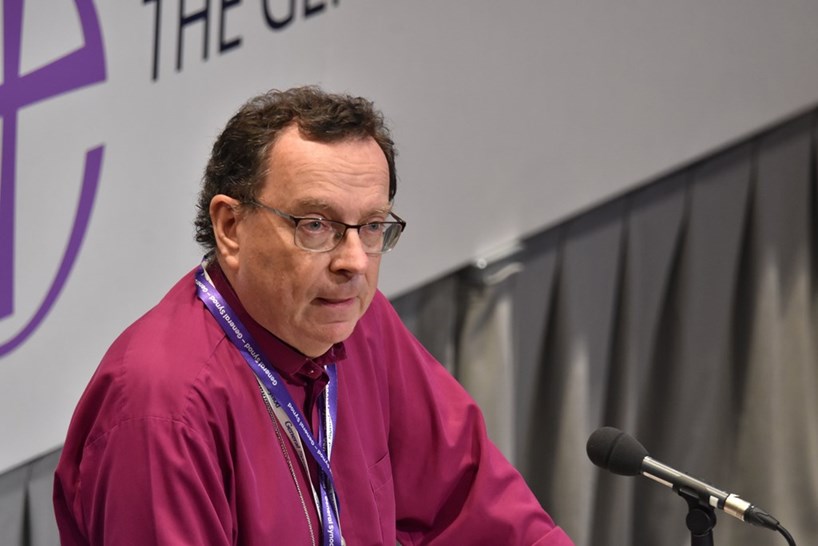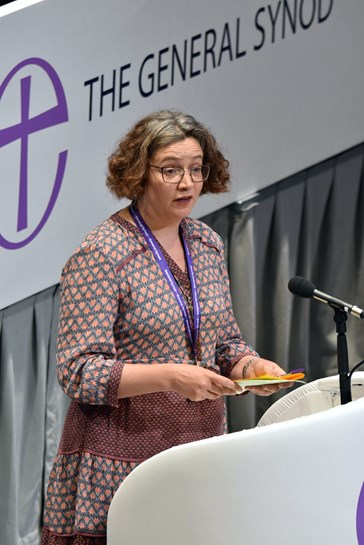THE long-awaited redress scheme for victims and survivors of abuse in a church context moved closer to completion on Monday, after the General Synod gave its final approval.
After nodding through some minor last-minute changes to the text of the Measure, members passed the draft law almost unanimously. Just one member voted against.
“We are treading on the sacred ground of people’s suffering,” the chair, the Archdeacon of Totnes, the Ven. Douglas Dettmer, warned the Synod as the debate began. He acknowledged the presence of survivors in the public gallery and others within the Synod’s membership.
Carl Fender (Lincoln), who chaired the steering committee, opened the debate by paying tribute to the many victims and survivors who had invested “time and energy to the process, despite the harm the Church has caused them”.
Planning for the scheme had begun as long ago as 2021, and many survivors had waited even longer for meaningful redress from the Church, he said. Setting up the scheme had proven complicated, however, and had required several rounds of careful drafting and consultation.
“We have listened, we have reflected, but now we must deliver,” he concluded.
The Bishop of Winchester, the Rt Revd Philip Mounstephen, who chaired the board overseeing the redress project, told the Synod that the scheme should never have been necessary. The failure of the Church to live out the gospel and instead collude in abuse was a “source of shame” and made the scheme absolutely vital.
The publication last autumn of the Makin report on John Smyth’s abuse had prompted a last-minute rethink of the scheme, which was already well-developed at the time, he said (News, 17 January). Realising that some of those who had been harmed by Smyth might not be eligible, the criteria had been widened, which the Bishop warmly welcomed.
 Sam Atkins/Church TimesThe Bishop of Winchester, the Rt Revd Philip Mounstephen, who chaired the board overseeing the redress project
Sam Atkins/Church TimesThe Bishop of Winchester, the Rt Revd Philip Mounstephen, who chaired the board overseeing the redress project
Mr Fender had already led the Synod through approving amendments to the legislation to implement this. Applicants to the scheme had to pass one of two tests: either the abuser had to have a “close connection” to the Church of England, or a separate church officer had to have “failed to act” to prevent abuse by a third party.
Some members had questioned whether this would include church officers who had genuinely tried to prevent the risk of abuse or report concerns, but in vain.
The Archdeacon for Rural Mission in the diocese of St Edmundsbury and Ipswich, the Ven. Sally Gaze, summed this up as: “You do the right thing, but then you’re not sure if the right thing has actually happened.”
The Archdeacon of Liverpool, the Ven. Miranda Threlfall-Holmes, told members that the scheme was not about “blaming people” but providing redress. Later, Mr Fender also reassured the Synod that the legislation had a “reasonableness” clause.
Several members in the main debate spoke movingly of the necessity of making recompense to those harmed by the Church. The Revd Jenny Bridgman (Chester) said that the Church was also traumatised by what had happened in its name, just as survivors were: “It is never them and us, it is we.”
Bishop Mounstephen urged the Synod to pass the Measure “unequivocally, as an expression of our corporate shame and repentance”.
The Church’s lead safeguarding bishop, the Bishop of Stepney, Dr Joanne Grenfell, said that the Measure was the start of the Church offering up “a hymn of repentance to God and committing to victims and survivors the truth and justice they deserve”.
Not every member was convinced, however. The Archdeacon of Leeds, the Ven. Paul Ayers, said that he would be unable to vote for the Measure because of his concerns that it might be unfair to alleged abusers. How could the redress body determine whether a claim of abuse was true or not if this had not already been established by a statutory body, he asked.
 Sam Atkins/Church TimesThe Archdeacon of Liverpool, the Ven. Miranda Threlfall-Holmes, told members that the scheme was not about “blaming people”
Sam Atkins/Church TimesThe Archdeacon of Liverpool, the Ven. Miranda Threlfall-Holmes, told members that the scheme was not about “blaming people”
A similar concern arose in a secondary debate on the rules that would implement the redress scheme. The Revd Jeffrey Terry (Truro) attempted to amend these so that the law firm which would administer the scheme could contact alleged perpetrators to give them a right of reply to claims. This amendment was resisted and lapsed due to lack of support on the floor of the Synod.
Archdeacon Ayers returned with another concern during the rules debate. He proposed an amendment to strip out the rule that asserted a Church officer’s failure to believe a disclosure of abuse as an aggravating factor when calculating a compensation payout.
Church officers should not be expected automatically to believe all claims, merely to act appropriately by passing on allegations to be investigated, Archdeacon Ayers argued. After a lively debate among members, this amendment was defeated.
Others, including the Bishop of Guildford, the Rt Revd Andrew Watson, had questions about who would be defined in the legislation as a “church officer”. Bishop Watson cautioned against the current proposal to include anyone who has begun the discernment process. Others worried that voluntary roles including chairing a diocesan board of finance or being a freelance church organist might slip through the gap of the definition.
Simon Eyre (Chichester) wondered whether there could be confidentiality protections for parishes that decided that they were unable to contribute financially to a redress payment, but could face reputational ruin should this fact became public and open to misinterpretation.
Finally, a former deputy lead bishop for safeguarding, the Bishop of Birkenhead, the Rt Revd Julie Conalty, successfully amended the rules of the scheme to ensure that previous payouts from the Interim Support Scheme would not be deducted from any subsequent awards made by the redress scheme.
While some members argued that this would cause inequity between survivors, the Synod was persuaded by Bishop Conalty’s argument that the Church should demonstrate the “ridiculous generosity” of God and not come across as “mean-spirited”.
Overall, the mood of the Synod was one of solemn determination to push the scheme forward. Several speakers urged members not to become fixated on the financial cost of compensation but instead seek true spiritual repentance. Peter Adams (St Albans) said that members should not simply just “hand over the cheque” but “own this in every other way we can”.
The Bishop of Rochester, Dr Jonathan Gibbs, also a former lead bishop for safeguarding, said that it would be impossible to build a Church in which abuse never happened, and therefore redress would always be necessary. “We need a realistic theology of human sinfulness,” he said, and a commitment to continual self-reflection and examination to avoid the temptation towards defensiveness.
After a moment of silent reflection, the Synod voted almost unanimously in favour of giving final approval to the Measure, which passed in a counted voted by Houses: Bishops 26-0, Clergy 129-1 (with one recorded abstention), and Laity 140-0.

















